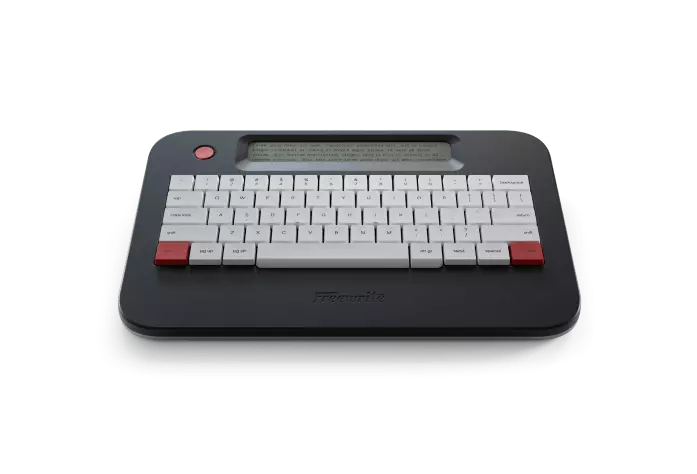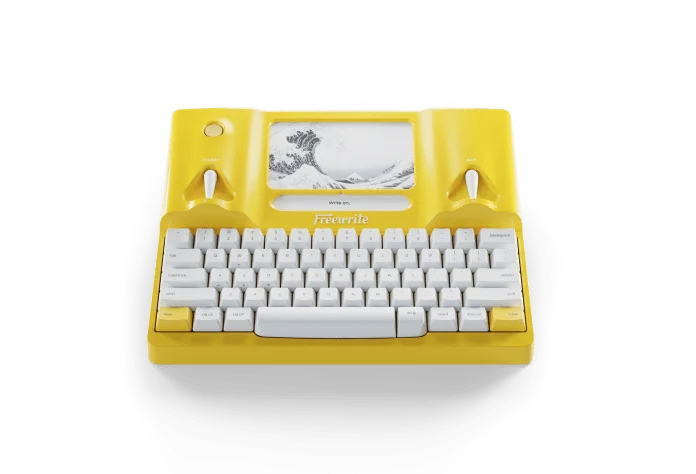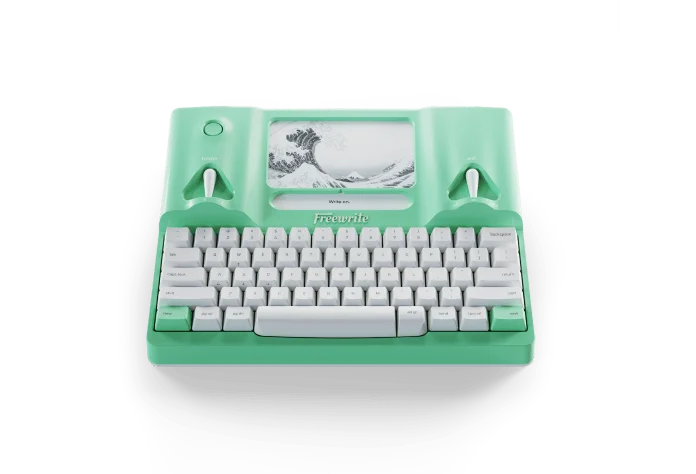
Jayce Carter has written more than 40 books and grown a ravenous reader base for her paranormal romance novels.
If the phrase "40 books" leaves you slack-jawed and speechless, you're not alone.
Jayce drafts her work on Freewrite for the ultimate distraction-free writing experience, but what else does she do to keep churning out fantastic fiction? Let's find out.
Let's start with: 40 books. Wow. How in the world did you do it?
I once had a mentor who told me to write 1,000 words every day. He even did this through the birth of children, through marriage and divorce and illness, never missing a day. I can’t claim to be that devoted — I have missed days, after all — but that mindset has really helped me to write daily.
I’ve found the more it becomes routine, the less I have to rely on motivation or self-discipline. Even if I only write a handful of words, writing anything helps to keep that momentum going.

What does your writing routine look like?
Writing is my full-time job, which means I typically work for eight hours a day, five days a week. I don’t spend that full amount of time only drafting, of course, and split it between writing, editing, and administrative work.
I prefer to get my writing done early in the morning, and usually start my day around 5 a.m. — before the kids wake up and decide they need stuff! I save administrative work — marketing, contracts, promos, stuff like that — for later in the day.
My daily word count can be anywhere between 500 and 10,000, but I usually strive for around 5,000 on a good writing day.
Romance readers are notoriously voracious. One stat we've seen is that 78% of romance readers read more than one novel per month, which is way higher than the average. Do you feel pressure to write fast to keep up?
The voracious appetite of romance readers is one of the reasons the genre fits me so well. I draft my stories quickly. This works out perfectly, because if I were in a different genre, I fear reader fatigue would set in.
But no matter how quickly I release books, there will always be a reader asking me when the next is coming. I won’t deny that this can cause a bit of pressure, but I find that motivating rather than stifling. I’m a person who does well with deadlines and pressure. I was that kid who never read a thing in school until five minutes before the test when I frantically thumbed through the pages of the text only to land a good grade somehow.
That sort of pressure helps me to work, honestly, and I appreciate how amazingly obsessive and kind my readers always are.
Name 3 concrete techniques you use to write fast.
1) I love to write in the early morning hours. This is before all the other nonsense of life can get in the way.
2) I'm a huge fan of tracking word counts. I use a bullet journal, and in it I have a full yearly spread so I can track my exact word count on every day. This really helps to keep me motivated to continue writing, since I know I’ll have to look at that number for the rest of the year!
3) I also use word sprints — writing as quickly as I can for a set period of time, and often with other people to hold me accountable.

Which Freewrite do you use?
Is this where I have to out myself? I actually own all three main Freewrite models.
I have my original — named Bob — who has fancy black key caps. I bought him when they first came out. I love him for the back light and he works best at a desk, but I’ve sure hauled him out on the town a time or two.
I bought Traveler when it first came out — named Travis — and have taken him on two cross-country road trips. He is fantastic for the small size and mobility, which is why he always comes on trips with me! I’ve written so many words in hotel rooms or in the back of a car as we drive.
Lastly, my Alpha — aptly named Adam — is my newest writing buddy. I use him the most, now, and keep him by my bed so I can write a bit in the evening while watching trash TV. Adam never judges me.
Our CEO's name is Adam. He's going to love this. Which is your favorite?
I can’t say because, to me, they all have very specific uses and I’m glad I have all of them for different reasons.
That's a cop out, but we'll take it.

Let's talk about your writing routine over the course of 40 books. Has anything changed?
There is so much! I started out as a stay-at-home mom who wrote by setting my Freewrite on top of my washing machine in the kitchen as I took care of my kids. I would jot down a few hundred words sitting in the car while I waited for my kids during school pick-up.
Now, however, I have my own office — a desk is much nicer than a washing machine, as it turns out. My kids are going into high school, which means I get to focus for hours a day on my work in a way that wasn’t possible before.
Having that extra time to focus is nice, of course, but the truth is that I sometimes miss the chaos of before.
Writing that first book is special. Everyone is a bit naïve about how it will go, and I miss that feeling of magic, that enthusiasm at having done something so amazing. By book 40, I’m still proud, of course, but it doesn’t sparkle quite like it did at first.
What is the biggest thing you wish you had known while writing book 1 that you know now?
I wish I’d trusted myself more. I spent a lot of years afraid to go for it.
I told myself I needed to learn more, to grow more as a writer, convinced I would reach some point where I was "ready" for it.
Instead, looking back, I realize it was just fear that kept me stagnant. I’d been afraid of hearing "no" from publishers, of failing something that meant so much to me, so I’d just kept practicing, telling myself it was for the best. It felt safer to never try than to risk trying and falling flat on my face.

What’s your #1 piece of advice for writers looking to be more prolific?
I have two.
1) Set reasonable goals! Too often I see people who aren’t writing at all deciding they’ll write 5,000 words a day, seven days a week. They ignore the realities of their lives, though, and set themselves up for failure. Instead of feeling motivated and proud by what they accomplish, they end up demoralized and defeated from day one when they inevitably can’t meet the unreasonable goal they set.
I’ve found setting lower goals to always be better. If I tell myself I’ll write 100 words, I nearly always write more. The pressure feels less imposing and I get that hit of dopamine from succeeding each time.
So make sure to set goals you can actually achieve and know that you can always set higher goals once it becomes routine!
2) Along that same idea, don’t be too hard on yourself. I’m one of those weird people who love Mondays, but do you know why? Because Monday is the start of a new week. No matter what last week was like, no matter how much or how little I got done, Monday offers me a fresh start. I can decide how thisweek will go.
There are weeks where I don’t get done what I want, where my kids are … well, teenagers, where I end up sick, where nothing goes right and I feel bad about it all. It’s so easy to let that get to us, to think one week defines us, but it doesn’t. We can always start again.
So every Monday I start over. I stop blaming myself for the week before, I stop feeling bad about it, and I just move forward with my plans for thisweek. I think people would be better off if we were all a little kinder to ourselves and saw Mondays as the fresh starts that we deserve!
--

Jayce Carter lives and writes in the desert of Southern California with her husband and two teenage spawns. She started writing flash fiction and literary pieces but grew to feel there wasn't nearly enough filth on the market. Her mother always told her to be the change she wanted to see in the world … advice her mother now regrets.
Jayce writes spicy reverse-harem stories with female characters who have to learn their own power and take control of their own lives. She prefers paranormal stories for all the other girls who were disappointed when the beast turned into a boring human.
Learn more about Jayce at jaycecarter.com or follow her on Instagram and Facebook.

























